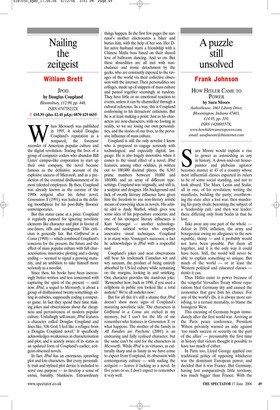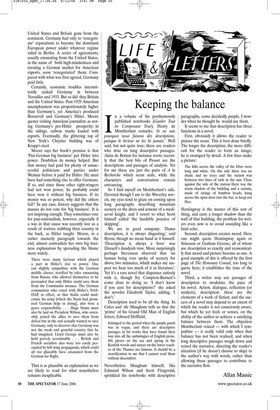A puzzle still unsolved
Frank Johnson
HOW HITLER CAME TO POWER by Sara Moore Authorhouse, 1663 Liberty Drive, Bloomington, Indiana 47403, £14.95, pp. 310, ISBN 142088557X, www.howhitlercametopower.com, email: sarafmoore@btinternet.com Sara Moore would explain a rise to power as astonishing as any in history. A down-and-out housepainter and plebeian agitator becomes master at 43 of a country whose most influential classes expected its rulers to be of some social standing, and not to look absurd. The Marx, Lenin and Stalin, all in one, of his revolution; writing the manifesto, building the party; overthrowing the state after a lost war; then murdering his party rivals; becoming the subject of a ‘leadership cult,’ and then war leader; there differing only from Stalin in that he lost.
Take away any one part of the whole defeat in 1918, inflation, the army and bourgeoisie owing no allegiance to the new republic, slump — and it probably would not have been possible. Put them all together, and it is the only way it could have been. Still, the world will never be able to explain something so unique. But much of the world — or at least the Western political and educated classes thinks it can.
Thus Hitler came to power because of the vengeful Versailles Treaty whose reparations bled Germany dry and caused the economics that gave him his chance. For any of the world’s ills, it is always more satisfying, to a certain mentality, to blame the bourgeois West.
This excusing of Germany began immediately after the first world war. Arriving at the Paris peace conference, President Wilson privately warned an aide against ‘too much success or security on the part of the allies’ — presumably the first time in history that victors thought it possible to have too much of either.
In Paris too, Lloyd George applied our traditional policy of opposing whichever was the dominant European power, and decided that it was France. But Germany, having lost comparatively little territory, was much bigger than France. With the United States and Britain gone from the continent, Germany had only to ‘renegotiate’ reparations to become the dominant European power under whatever regime ruled in Berlin. A series of agreements, usually emanating from the United States, in the name of both high-mindedness and creating a German market for American exports, soon ‘renegotiated’ them. Compared with what was first agreed, Germany paid little.
Certainly, economic troubles intermittently racked Germany in between Versailles and 1933. But so did they Britain and the United States. Post-1929 American unemployment was proportionately higher than Germany’s, yet America’s produced Roosevelt and Germany’s Hitler. Moore quotes visiting American journalists as noting Germany’s pre-Hitler prosperity; in the sidings, railway trucks loaded with exports. Eventually, the glittering top of New York’s Chrysler building was of Krupp’s steel.
Moore says her book’s premise is that ‘Pan-German big business’ put Hitler into power. Doubtless its money helped. But that money had paid for plenty of unsuccessful politicians and parties under Weimar before it paid for Hitler. He must have had something else to offer Germans. If so, and since those other right-wingers had not won power, he probably could have won it without big business. If its money was so potent, why did the others fail? In any case, history suggests that the masses do not vote for ‘big business’. It is not inspiring enough. They sometimes vote for pan-nationalism, however, especially if a war in that cause was recently lost as a result of traitors stabbing their country in the back, as Hitler taught. Moore, in a rather masterly paragraph towards the end, almost contradicts her own big business explanation by spreading the blame more widely.
There were many factions which played a part in Hitler’s rise to power. One can slightly sympathise with the German middle classes, terrified by tales emanating from Russia, who allowed themselves to be persuaded that only Hitler could save them from the Communist menace. The German communists who voted with Hitler’s NASDAP, in effect, so that Stalin could modernise his army [which the Nazis had promised German help in doing], also bore a grave responsibility . . . Huge blame must also be laid on President Wilson, who ostensibly joined the allies to save them from defeat but in the end actually wanted to save Germany, only to discover that Germany was not the weak and grateful country that he had imagined. Lloyd George must also be held gravely accountable . . . British and French socialists also were too easily persuaded by left-wing propaganda, which could all too plausibly have emanated from the German far Right.
That is as plausible an explanation as we are likely to read for what nonetheless remains inexplicable.



















































































 Previous page
Previous page